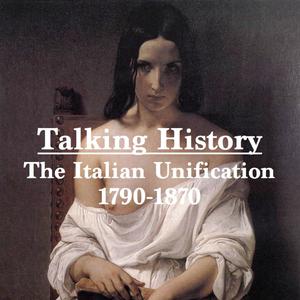
Talking History: The Italian Unification
Benjamin & Adam Ashwell
- 40 minutes 7 seconds51 - The End
We've come to the end of the series - this will be the last episode of our story. I'd like to spend this episode addressing some of the big questions that the series raised:
First, was unification inevitable?
Second, was the incorporation of Southern Italy into the new Italian state a result of conquest or unification?
And third, what was the legacy of the three men we focused on: Cavour, Garibaldi, and Mazzini?
Then I'll wrap up with a few closing remarks and say goodbye.
23 June 2019, 10:48 pm - 1 hour 24 minutes50 - Rome or Death
In this penultimate episode we'll cover the period from 1861 to 1871 and reach the end of our story. Italy started as a collection of small states, many of them ancient, and now the entire peninsula, minus a few outlying areas that Italy would gain after WWI, has been unified under a single government based in the ancient city of Rome. This was an amazing, almost unbelievable achievement. The Kingdom of Italy had weathered the death of its leading statesman only a few months after its formation, had survived a brutal civil war in the south, uprisings and revolts, had suffered disastrous war with Austria, and now had ended the thousand-year-old temporal power of the popes. But it had come at a price paid in money, tears, and blood.
18 December 2017, 1:39 am - 54 minutes 52 seconds49 - The Harsh Light of Day
We're closing in on the end of the story of the Italian unification. Through both force of arms and cunning, Piedmont has conquered almost all of Italy - from the perspective of grand, heroic history, we've already passed the climax and we’re just tying up loose ends. But that’s not how I feel about it - because we're about to leave the heady days of high hopes and dreams for the future into the murky realm of mistakes, and of what might have been.
12 June 2017, 12:36 am - 1 minute 24 secondsPodcast Delay Update
A brief update on the podcast delays.
19 March 2017, 10:08 pm - 46 minutes 8 seconds48 - A Kingdom is Born
1860 was a bad year to be a cartographer - or maybe a good year, depending on how you look at it. In 1859 there had been seven states in Italy: the Kingdom of Piedmont, the Austrian-controlled Kingdom of Lombardy-Venetia, the Grand Duchy of Tuscany, the Duchy of Parma, the Duchy of Modena, the Papal States, and the kingdom of the Two Sicilies. But, after the Second War of Italian Independence, which pitted France and Piedmont against Austria, we saw that number shrink to four, as Tuscany, Modena, and Parma all disappeared into the Kingdom of Piedmont, which also absorbed the Lombardy half of Lombardy-Venetia, and the northeastern parts of the Papal States, called the Legations. Just as the ink was drying on the revised maps, Garibaldi set sail to Sicily with just over 1,000 men in an event that has moved into the realm of mythology in Italian history - akin perhaps to Washington’s Crossing of the Delaware in American history.
22 October 2016, 10:38 pm - 42 minutes 47 seconds47 - David and Goliath
Ever since the fall of the Roman Republic to the French army in 1849, we've focused pretty exclusively on events in Northern Italy, because that was there the action was. That is going to change. Distracted by the annexation of most of northern Italy, Piedmont will temporarily lose the initiative, which will pass into the hands of the republicans and revolutionaries, and in particular, to Garibaldi. Today we begin the famous story of The Thousand, or in Italian, Il Mille.
20 July 2016, 3:23 am - 1 hour 1 minute46 - A Vote for Italy
In the space of a single year, Italy will change forever, emerging from the Second War of Italian Unification with an entirely new political landscape.
9 April 2016, 9:58 pm - 39 minutes 12 seconds45 - The Die is Cast
It's the beginning of 1859, and we're at a pivotal point in the story. While it would be an exaggeration to say that the entire Italian Unification hinges on the events of this episode, the timing of events here will play a role in everything to come. The plan was for Cavour to stir up trouble in the duchy of Modena, which would lead to an escalating series of diplomatic incidents that would start a war between Piedmont and Austria, while making Austria look like the aggressor. France would then come to Piedmont's aid and crush the Austrians. We'll see Cavour's plan begin to crumble as the rest of Europe attempts to intervene to stop the war before it starts. In desperation, the lifelong gambler will double down on his plan. In the end, it will be Austria's foolishness rather than his cleverness that makes the difference, and he will win despite himself.
24 January 2016, 7:04 pm - 40 minutes 23 seconds44 - A Recipe for War
A new election in Piedmont will threaten to unseat Cavour, who will only survive through cunning, ruthlessness, and good old fashioned cheating. An assassination attempt on French Emperor Napoleon III will either warm the cockles of his heart or fan the flames of his ambition. Either way, Napoleon III will get serious about supporting Piedmont in a war against Austria. Cavour and Napoleon will meet and hash out the future of Italy in a single afternoon, including a pretext for war.
25 November 2015, 2:22 am - 50 minutes 19 seconds43 - The Wounded Heart of Italy
In this episode we're going to catch back up with both of our revolutionary friends Mazzini and Garibaldi. We'll start with Mazzini and the internal politics of the revolutionary movement post-1848, and then we'll get into a renewed round of revolutions. We'll then see Garibaldi wander the face of the globe searching for some peace and happiness. Then, toward the middle of the 1850's, Cavour will begin to infiltrate the revolutionary movement, laying plots and plans of his own, securing his reputation as a devious, manipulative political genius.
7 September 2015, 9:10 pm - 1 minute 49 secondsPodcast Update
Release schedule update.
2 August 2015, 5:32 pm - More Episodes? Get the App
Your feedback is valuable to us. Should you encounter any bugs, glitches, lack of functionality or other problems, please email us on [email protected] or join Moon.FM Telegram Group where you can talk directly to the dev team who are happy to answer any queries.
 Dan Snow's History Hit
Dan Snow's History Hit
 Tides of History
Tides of History
 The Ancients
The Ancients
 The Rest Is History
The Rest Is History
 History Extra podcast
History Extra podcast
 In Our Time
In Our Time